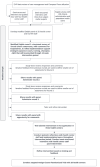This is a preprint.
Implementation strategies to improve adoption of unmet social needs screening and referrals in care management using enabling technologies: study protocol for a cluster randomized trial
- PMID: 39483896
- PMCID: PMC11527237
- DOI: 10.21203/rs.3.rs-4985627/v1
Implementation strategies to improve adoption of unmet social needs screening and referrals in care management using enabling technologies: study protocol for a cluster randomized trial
Abstract
Background: Adverse social determinants of health contribute to health inequities. Practice guidelines now recommend incorporating patient unmet social needs into patient care, and payors increasingly reimburse for screening and providing related referrals to community organizations. Emergent electronic health record (EHR)-based tools can enable clinical-community linkages, but their adoption commonly faces workflow and infrastructure barriers. Targeted implementation support such as training, championship, practice facilitation, and audit and feedback, can enhance such tools' adoption, but no prior research has assessed such strategies' impact on the adoption of 'enabling technologies' supporting clinical-community linkages. This study will test whether providing targeted implementation support to safety-net primary care health center care management teams improves the sustained adoption of EHR-based enabling technologies used to 1) screen for social needs and 2) link patients to community organizations.
Methods: Formative evaluation of barriers and facilitators to adopting EHR-enabled social needs referrals and ascertainment of services received will include semi-structured interviews and a 'guided tour' of enabling technology used by care managers serving patients with complex health and/or social needs. A modified Delphi process conducted with care management staff and subject matter experts will then inform the development of an intervention targeting adoption of social risk EHR-enabled tools. The intervention will be piloted in three health centers, refined, then tested in a pragmatic stepped-wedge cluster-randomized trial in 20 health centers (five wedges of four health centers) that provide care management to high-risk patients with social needs.
Discussion: This study is among the first to evaluate an intervention designed to support care management teams' adoption of enabling technologies to increase clinical-community linkages. It was funded in September 2023 by the National Institute of Nursing Research. Formative activities will take place from January to June 2024, the intervention will be developed in July-December 2024, the pilot study will be conducted from January-March 2025, and the cluster-randomized trial will occur from July 2025 -September 2026. Study data will be analyzed and results disseminated in 2027-2028. Study results have the potential to improve clinical-community linkages and in so doing to advance health equity.
Trial registration: Clinicaltrials.gov registration # NCT06489002. Registered July 5, 2024, https//clinicaltrials.gov/study/NCT06489002?term=NCT06489002&rank=1.
Keywords: care management; clinical-community linkages; health disparities; primary care; safety-net populations; social determinants of health.
Conflict of interest statement
Declarations Competing interests The authors declare that they have no competing interests
Figures
References
-
- Woolf SH. Progress In Achieving Health Equity Requires Attention To Root Causes. Health Aff (Millwood). 2017;36(6):984–91. - PubMed
Publication types
Associated data
Grants and funding
LinkOut - more resources
Full Text Sources
Medical



